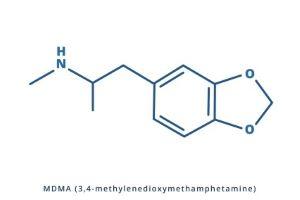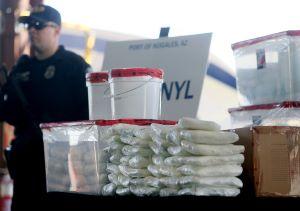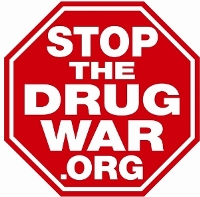Justice for Leila de Lima has been a long time coming.
The Psychopharmacologic Drugs Advisory Committee had doubts approving a treatment program that uses MDMA in psychotherapy as a treatment for Post Traumatic Stress Disorder. Advocates are dismayed and say it's a lifesaver.
Our first-ever magazine review. This smart and scrappy rag has earned it.
Mississippi patients are going to catch a break starting next month, and more.
A CBP agent in San Diego got greedy, so did some coke-snatching cops in Columbus, and more.
A New Jersey psilocybin legalization bill gets amended into a therapeutic psilocybin services bill, bipartisan Pennsylvania lawmakers prepare to roll out a marijuana legalization bill, and more.
Federal legislation has been filed to ensure Job Corp applicants are not automatically canned for a second positive pot test, San Francisco takes aim at "drug-permissive" housing for the homeless, and more.
The Colombian Army has raided a coca- and cocaine-processing complex in Norte de Santander just as it has raided countless complexes before in its fruitless quest to repress the cocaine trade, and more.
Louisiana's hard right governor vetoes a bill that would have eased the pardon process for first-time marijuana possession offenders, the House Committee on the CCP forms a fentanyl working group, and more.
Activists in Dallas hand in signatures for a municipal decriminalization initiative, Arizona's governor signs a bill that would allow for therapeutic MDMA with federal approval, and more.
A bipartisan marijuana legalization bill gets filed in the Pennsylvania House, Louisiana's governor signs a bill decriminalizing pot paraphernalia, and more.
Justice for Leila de Lima has been a long time coming.

Philippines former Senator Leila de Lima is now a free woman. (Forum Asia)
Philippines former senator Leila de Lima, a leading critic of former President Rodrigo Duterte's murderous anti-drug campaign, is finally free of all the bogus charges brought against her by the Duterte government. She was arrested in February 2017 and faced three fabricated drug-related charges. She remained in jail until last November, when she was freed on bail on the final charge against her. The first and second charges against her had been dropped in 2021 and 2023, respectively, following recantations by key witnesses who said they'd been coerced into accusing the senator. This past Tuesday, Muntinlupa Regional Trial Court Branch 206 granted de Lima's motion to dismiss the case, clearing her of a final charge of conspiracy to commit drug trading.
De Lima, then a sitting senator, was charged by Filipino authorities after she moved to investigate human rights and other violations committed during Duterte's bloody war on drugs, a campaign that NGOs estimate left somewhere north of 30,000 people dead. International human rights groups such as Amnesty International have said the campaign may amount to crimes against humanity, and the International Criminal Court (ICC) is currently investigating Duterte over the killings and other human rights abuses.
The following year, the UN Working Group on Arbitrary Detention declared that de Lima's arrest and imprisonment were indeed arbitrary, citing the lack of a legal basis for the charges and the Philippine government's failure to observe international norms demanding the right to a fair trial.
The court proceedings that dragged on for the last six years were plagued by undue delays, including changes in the judges handling her case. Prosecution witnesses repeatedly failed to appear in court, with some saying they had been threatened by government officials into making false statements about her. Amnesty International had designated her as a prisoner of conscience, solely imprisoned for her legitimate human rights work.
The political persecution of de Lima reflects the broader context of increasing impunity for human rights violations in the country, not only under the Duterte administration but to a lesser degree, also under the administration of President Ferdinand "Bong Bong" Marcos, Jr., son of a former dictator. Those violations include killings, threats, and harassment of political activists, human rights defenders, members of the media, and other targeted groups.
Amnesty International welcomed the closing of the final case against de Lima.
"This is full freedom and vindication, finally, for human rights defender Leila de Lima, after her nearly seven years of arbitrary detention, as well as relentless political persecution," said Montse Ferrer, Amnesty International's Deputy Regional Director for Research. "De Lima's acquittal in this last outstanding case is long overdue, and every day she spent in jail until her temporary release in November 2023 was a gross injustice. She was viciously targeted by the administration of former President Duterte solely for her efforts to expose human rights violations in the so-called 'war on drugs'. Today's dismissal of the last drug-related allegation against her is a clear rejection of concerted government efforts to silence her and undermine her human rights work."
But there is more work to be done, Ferrer said.
"As de Lima fully regains her freedom, we urge the administration of President Marcos to work towards ensuring an enabling environment for her and for many other human rights defenders in the Philippines who continue to be targeted because of their critical work," Ferrer said. "We also challenge the Marcos administration to impartially and effectively investigate those responsible for the unfounded allegations against de Lima that led to her arbitrary detention and the other human rights violations she has endured -- and continues to endure -- and bring them to justice in fair trials."
And the drug war killings have not stopped, the human rights group noted.
"The government must work towards what de Lima, Amnesty International, and many other human rights defenders have been tirelessly calling for: an end to the continuing unlawful killings and other violations in the 'war on drugs', accountability for the perpetrators, and justice for the thousands of victims and their families," Ferrer said.
Watch our March 2024 event where Senator de Lima keynoted, at the UN Commission on Narcotic Drugs meeting in Vienna:
back to top
On Tuesday June 4, an independent advisory panel of the Food and Drug Administration (FDA) recommended that the agency not approve an MDMA-assisted therapy for the treatment of Post-Traumatic Stress Disorder (PTSD) application. The recommendation is only advisory -- not binding -- but the FDA ultimately agrees with advisory panel rejections of drugs two-thirds of the time.

The MDMA molecule. (NIDA)
The votes were not close. The Psychopharmacologic Drugs Advisory Committee (PDAC), on the basis of the research done so far, voted 10-1 that the proposed treatment's risks outweighed its benefits and 9-2 that it was not proven effective.
PDAC's review included results from two randomized, double-blind, placebo-controlled Phase 3 studies (MAPP1 and MAPP2) evaluating the efficacy and safety of MDMA used in combination with psychological intervention, which includes psychotherapy (talk therapy) and other supportive services provided by a qualified healthcare provider, versus placebo with psychological intervention in participants diagnosed with severe or moderate to severe PTSD, respectively. Both MAPP1 and MAPP2 studies met their primary and secondary endpoints and were published in Nature Medicine.
The panelists' questions and comments betrayed concerns that while study participants were divided into two groups, one receiving the drug and one receiving a placebo, those who received the drug could tell they had the drug and not the placebo, due to the drug's psychoactivity. They also expressed concerns about possible bias among therapists who guided the sessions that could have influenced patient outcomes.
The hearing also put some of the tensions within the pro-psychedelics movement on display. For example, a member of the public who is wary of the intersection of psychedelics and big business, Ohio State University lecturer Brian Pace, described the entity spearheading the MDMA FDA effort, Lykos (formerly known as MAPS Public Benefit Corporation) as a "therapy cult," criticizing Multidisciplinary Association for Psychedelic Studies founder Rick Doblin for proselytizing for psychedelics.
Committee members also said that Lykos had not collected detailed data from participants on "positive effects" of the drug, which is commonly called "Ecstasy" because of its blissful effects.
"I absolutely agree that we need new and better treatments for PTSD," said Paul Holtzheimer, deputy director for research at the National Center for PTSD, as he voted that MDMA-assisted therapy's benefits did not outweigh its harms. "However, I also note that premature introduction of a treatment can actually stifle development, stifle implementation and lead to premature adoption of treatments that are either not completely known to be safe, not fully effective or not being used at their optimal efficacy."
There has not been a new treatment for PTSD since the beginning of the century. The condition, first diagnosed about military veterans but now diagnosed more broadly, affects about 13 million Americans. It is linked to high suicide rates among veterans, and their suffering has prompted politicians and the public alike to revisit their attitude toward psychedelic therapies.
The session opened with remarks from Dr. Tiffany Farchione, director of the FDA's division of psychiatry, who noted that MDMA posed unique regulatory challenges, but also that the results of the Lykos studies were significant and enduring.
"Although the application presents a number of complex review issues, it does include two positive studies in which participants in the midomafetamine [MDMA] arm experienced statistically significant and clinically meaningful improvement in their PTSD symptoms," she said. "And that improvement appears to be durable for at least several months after the end of the acute treatment period."
Some 30 speakers addressed the panel before it voted and most supported moving forward. Typical was Cristina Pearse, who said she had developed PTSD after a childhood sexual assault, tried various psych medications, and even attempted suicide. MDMA-assisted therapy changed her life, she told the panel.
"What used to feel like a tsunami of overwhelming panic was now merely a puddle at my feet," said Pearse, who urged the FDA to approve the application. "How many more people need to die before we approve an effective therapy?" she asked. "As you weigh the risk, please keep in mind that this therapy can save many lives. I lost most of my life to this disease. I'm grateful to reclaim it now. But I wish this was an approved medication decades ago."
In the wake of the panel's decision, Lykos pronounced itself disappointed.
"We are disappointed in today's vote given the urgent unmet need in PTSD and appreciate that the committee faced a challenging and atypical assignment, which was to evaluate a therapeutic approach that combines drug therapy (MDMA) and psychological intervention," Amy Emerson, Chief Executive Officer of Lykos Therapeutics said in a statement. "We remain committed to working with the FDA to address outstanding questions so that we may find a path forward to ensure the responsible and careful introduction of MDMA-assisted therapy into the healthcare system, if approved. We are grateful to the advocates, clinical trial participants and people living with PTSD who shared their testimony in the open public hearing and through written comments, and will continue to do everything we can to bring this potential new therapeutic option to people living with PTSD."
Reason for Hope, a nonprofit policy and advocacy organization dedicated to advancing safe and equitable access to psychedelic therapies to improve mental health and prevent deaths of despair, and the Veteran Mental Health Leadership Coalition, a member-based organization under Reason for Hope that focuses on increasing access to psychedelic therapies for Veterans, took the decision even harder.
"We are profoundly disappointed by the FDA Advisory Committee's vote against approval of MDMA for use with therapy (MDMA-AT) to treat post-traumatic stress disorder. Unfortunately, the Committee completely lost sight of the big picture amidst a novel and complex application," said cofounder of Reason for Hope and Founder & President of the Veteran Mental Health Leadership Coalition, Lieutenant General Martin R. Steele, US Marine Corps (Retired) in an email to supporters.
"It is hard to describe how tragic and heart-wrenching this vote was for so many of our veterans, who have been on the frontlines battling for more research and compassionate use access to this treatment. Indeed, we lose 17-44 veterans every single day to deaths of despair such as suicide or overdose -- often resulting from unresolved trauma in service to this country -- and the problem only seems to be getting worse. Despite rates of PTSD and suicide increasing for decades, we have seen little progress with new treatments, including no new FDA-approved drugs for PTSD in over 20 years."
Steele cited the "incredible success stories utilizing MDMA-AT" before blasting the panel, saying that "Yet, even despite the incredibly promising efficacy results in clinical trials developed in consultation with and agreed upon by the FDA, the Committee unfortunately could not seem to grasp the research nor post-approval regulation of a drug plus therapy combination. Members of the Committee seemed confused about what they were even voting on."
The PDAC's votes on Tuesday are a setback for MDMA-assisted therapy, but also just another step in a long, long process. The FDA will decide whether to accept the panel's recommendations in August, and the process will proceed from there, one way or another.
back to top
Our first-ever magazine review. This smart and scrappy rag has earned it.
Chronicle Magazine Review: The Baffler, No. 74, Altered States (June 2024,136 pp., $14 PB)
Writing about drugs and drug policy doesn't have to come from academic presses or book-length journalistic reportage. Maia Szalavitz writes consistently cogent and well-informed short pieces on various aspects of drug policy as a contributing opinion writer for The New York Times. And well-respected periodicals such as The Atlantic, Harper's, the New Republic, and the New Yorker, among others, have contributed invaluable article-length reporting on drug topics over the years.
And then there's The Baffler. Founded in 1988 by progressive journalists Thomas Frank (of "What's The Matter with Kansas?" fame) and Keith White, the feisty magazine has produced punchy social, cultural, and political reporting and smartly written analysis from the left side of the spectrum ever since. The rag has covered drug-related topics off and on from the beginning, but now it has produced an entire issue on the world of dope, and it's good, thought-provoking stuff.
Some of it is a bit on the esoteric side, as with "K-Pop: Our Forefathers Did Disassociatives," journalist Dan Piepenbring's examination of the current fascination with ketamine in light of the 19th Century use of ether and nitrous oxide and the never-ending pursuit of profound, but sadly fleeting, enlightenment. Likewise, writer and translator Dylan Levi King's "Sinopharmacology: Psychonauts with Chinese Characteristics," takes the reader on a tour of the Chinese recreational drug scene, a fascinating excursion through an alien land.
But some of it strikes closer to home, such as Baltimore writer and author Baynard Wood's examination of tensions between supporting organized labor and supporting moves toward social equity in Maryland's legal marijuana business. He also has a thing or two to say about working conditions in the "glamorous" cannabis industry in "High Expectations: Budding labor tensions in the cannabis industry."
And given the ongoing drug overdose crisis, it is no surprise that opioid policy generates two articles, with Chicago journalist Zachary Siegel taking on the framing of repeated "epidemics" in "Permanent Crisis: Myopic responses perpetuate the 'opioid epidemic,'" and finding much wanting. Meanwhile, author Ann Neumann makes the case that we continue to demonize opioid pain patients at the cost of much human suffering and indignity in "Pain and Suffering: Demonizing opioids has unintended consequences."
But wait, there's more: In "A Drug Against War: The Militarization of Ecstasy," Philadelphia writer John Semley examines the tensions and contradictions of attempting to bring psychedelic therapies to the public in concert with venture capitalists as he charts Lykos Therapeutics' (formerly known as the Multidisciplinary Association for Psychedelic Studies' Public Benefit Corporation) path to getting Ecstasy approved for PTSD treatment by the FDA. The article was published just before an FDA panel recommended rejecting the application, which adds a different tinge to it now. Semley also examines the ironies of military veterans becoming the spearhead of the push for therapeutic psychedelics, especially given the national security complex's history of attempting to use various substances for nefarious purposes.
And journalist, author, and CUNY professor Osvaldo Zavala does a brilliant skewering of the mythical collaboration between Hamas and the Sinaloa Cartel on tunnel construction techniques. A claim that rises up periodically from a former Israeli military officer who has a company peddling border security products, it is a compelling propaganda effort, bringing together two of contemporary America's scariest bogeymen. Zavala gleefully demolishes the claim and its ideological underpinnings in "Tunnel Vision: Notes from the Underground, from Sinaloa to Gaza."
And there's some bonus, non-drug material as well, including a piece on George Santos and the end times, another piece on the cultural history of McGruff the crime dog, and various poems scattered about, including "Ording a casket from Amazon Prime."
If you're a drug policy wonk and ever needed a reason to pick up The Baffler, this is it. Or if you're just a fan of good writing on contemporary culture, hey, another issue of The Baffler is on the newsstands now.
back to top
Mississippi patients are going to catch a break starting next month, and more.
Connecticut
Connecticut Medical Marijuana Board of Physicians Approves Two New Qualifying Conditions. The Department of Consumer Protection has added two new conditions to the list of qualifying conditions for the Medical Marijuana Program. The conditions were unanimously approved Friday by the Medical Marijuana Program Board of Physicians.
The two conditions unanimously approved for individuals 18 and over to the program are: Autism Spectrum Disorder and Female Orgasmic Difficulty/Disorder.
"Thank you to the petitioners who gave thoughtful and well-researched presentations to the Board, and shared their personal stories with these conditions," said DCP Commissioner Bryan T. Cafferelli. "I would also like to thank the Board of Physicians for volunteering their time to share their medical expertise, and for their thoughtful questions and consideration of the petitions."
There are currently 39,749 medical marijuana patients, and 1,816 certifying physicians registered with the state’s program. There are 42 conditions that qualify adult patients for medical marijuana, and 11 conditions that qualify patients under 18. The Board of Physicians consists of nine members.
Qualifying patients and their caregivers registered with the Medical Marijuana Program can purchase medical marijuana products at medical marijuana dispensary facilities and hybrid retailers.
- Medical marijuana is not subject to sales and excise tax at dispensary facilities and hybrid retailers.
- Medical Marijuana Patients receive priority entry at hybrid retailers.
- Medical Marijuana Patients may purchase up to 5 ounces per month.
- Certain products, including those with higher potency and some dosage forms, are only available to registered medical marijuana patients.
Those who wish to petition the Board of Physicians to add a debilitating condition to qualify for medical marijuana may visit DCP's Medical Marijuana Program website at http://ct.gov/dcp/mmp to read about the process. Any questions can be directed via email to [email protected].
Mississippi
Mississippi Medical Marijuana Patients Will Catch a Break Next Month. Beginning July 1, medical marijuana patients will be able to procure a month's worth of their medicine at a time. The state caps patients' medical marijuana purchases at 21 grams per week, so that means patients will now be able to purchase up to 84 grams (three ounces) in one trip.
The change is thanks to the passage of Senate Bill 2857, authored by State Senator Kevin Blackwell (R).
Bill supporters successfully argued that the change was necessary to accommodate patients who live far from a dispensary. Under the state's medical marijuana program, cities and counties can decide whether or not to allow dispensaries in their localities, and 80 cities and 17 counties have chosen not to allow them, leaving some patients stuck having to go considerable distances to find one.
"For instance, a patient with a debilitating condition might have to drive 45 minutes one way to go to a dispensary, and then have to do that every week of the month," said Rep. Lee Yancey (R), a key member of the House Drug Policy Committee. "It was a hardship on them to be able to get their medicine. You can get a month’s supply of opioids, so why not get a month's supply of medical cannabis if you already have a card from a practitioner confirming that you have debilitating condition?" Yancey said.
back to top
A CBP agent in San Diego got greedy, so did some coke-snatching cops in Columbus, and more. Let's get to it:
In Boston,
a former state prison guard was sentenced Monday to probation for his role in a large-scale drug trafficking conspiracy involving cocaine, fentanyl, and other drugs. Gregorit Sanchez, 29, went down when he was caught attempting to smuggle a package containing fentanyl, cocaine, Suboxone and other contraband into the Middleton House of Correction back in 2021. The package contained 33 grams of fentanyl pills, 1 gram of crack cocaine, 14 grams of powder cocaine, and Suboxone sublingual films, as well as cigarettes and a SIM card for a contraband cellphone that Sanchez had previously procured for the prisoner to whom he was delivering the goodies. In March, Sanchez pleaded guilty to one count each of conspiracy to distribute and to possess with intent to distribute fentanyl, cocaine, and other controlled substances and possession with intent to distribute fentanyl, cocaine, and other controlled substances.
In New York City, a former Rikers Island prison guard was sentenced Tuesday to three years in federal prison for taking bribes from prisoners to smuggle contraband including marijuana into the prison. Former guard Jason Skeet, 46, admitted smuggling weed, cigarettes, and food about a hundred times in return for which he received payments of tens of thousands of dollars. He pleaded guilty to conspiracy to commit bribery in US district court.
In San Diego, a former US Customs and Border Patrol officer was convicted June 10 of taking bribes from groups that wanted to smuggle drugs and people across the border. Former agent Leonard Darnell George was found guilty of working for two separate criminal organizations, allowing vehicles with illegal drugs and other vehicles with illegal immigrants. He worked the San Ysidro port of entry, and on at least 19 occasions allowed vehicles with illicit cargo through. In one instance, he let through 200 pounds of meth, then collected $13,000 for his efforts. He was found guilty of receiving bribes by a public official, conspiracy to import controlled substances, and two counts of bringing in certain aliens for financial gain. It is unclear when his sentencing date is.
In Columbus, Ohio, a former Columbus officer pleaded guilty June 12 to stealing cocaine in order to resell it. Former officer John Castillo is one of two Columbus Police officers who were charged in the case. He was assigned to investigate drug crimes when he and former officer Joel Medford decided to steal 10 kilos of cocaine they seized in a raid instead of turning it in as evidence. They also planted two kilos of cocaine as evidence for other officers to find. Castillo pleaded guilty to possession with intent to distribute five kilograms or more of cocaine, according to United States Attorney Kenneth Parker. Medford, accused of more ripoffs, is facing a federal trial in September.
back to top
A New Jersey psilocybin legalization bill gets amended into a therapeutic psilocybin services bill, bipartisan Pennsylvania lawmakers prepare to roll out a marijuana legalization bill, and more.

A Dutch marijuana coffee shop. Now, shops in 10 cities can obtain a legal, licensed supply of marijuana. (Creative Commons)
Pennsylvania Lawmakers Announce ] Marijuana Legalization Bill. Reps. Aaron Kaufer (R-Luzerne) and Emily Kinkead (D-Allegheny) on Monday announced they plan to introduce the first comprehensive, bipartisan adult-use cannabis legalization bill in the House, prioritizing public safety, consumer protection, social equity, and criminal justice reform.
The pair said their bill would build on the state's medical marijuana program and create jobs and tax revenues while helping to erase the black market.
"This bill underscores our commitment to responsible regulation of the cannabis industry while addressing the diverse needs of Pennsylvania’s communities," said Kaufer. "By prioritizing public safety and consumer protection, this legislation will build on the successful regulatory structure of the state's medical cannabis program, continuing stringent standards for product quality, packaging, and labeling to ensure the well-being of all consumers."
"It is well past time for the Commonwealth to legalize cannabis for recreational use, address the injustices of the failed War on Drugs, and ensure that Pennsylvanians can benefit from this industry in the same way our neighboring states have," said Kinkead. "Our bipartisan effort to provide specific language that takes the best practices from other states is the next substantial step in finally getting this done."
Psychedelics
New Jersey Lawmakers Amend Psilocybin Legalization Bill, Turning It into a Therapeutic Use Bill. An Assembly bill that would legalize the use, cultivation, and possession of psilocybin mushrooms, Assembly Bill 3852, has been transformed into a bill that would only authorize the therapeutic use of the drug. The Assembly Health Committee amended the bill on Monday.
A companion bill in the Senate has met a similar fate.
As filed, the two bills would have made it legal for adults to "possess, store, use, ingest, inhale, process, transport, deliver without consideration, or distribute without consideration, four grams or less of psilocybin." The now-amended bills instead envision a Psilocybin Advisory Board that would establish qualifying conditions for use, propose guidelines for psilocybin services, and oversee the nascent industry.
The amended bills also contain a social equity program that would provide financial assistance to help cash-strapped people cover the cost of therapeutic psilocybin services.
The bill now heads for an Assembly floor vote.
Harm Reduction
Vermont Lawmakers Override Governor's Veto of Safe Injection Site. In a dramatic session Monday, the General Assembly first fell one vote short of overturning Gov. Phil Scott's (R) veto of a bill authorizing a safe injection site, House Bill 72, then reversed itself and overrode his veto by the same one-vote margin.
State law requires a two-thirds supermajority to override a veto. The House voted to override, but the Senate came up one vote short on the first try.
With the successful override, Vermont becomes the third state to authorize safe injection sites, after Minnesota and Rhode Island. But New York City remains the only jurisdiction to actually open one.
International
Dutch Experiment with Legal Marijuana Supply Expands. Beginning this week, an experiment with creating a legal, licensed marijuana supply for the country's famous marijuana-selling coffee shops is undergoing a major expansion. The program with coffee shops in two cities, Breda and Tilburg, last December, but is now expanded to eight more cities.
Now, as many as 80 coffee shops in 10 Dutch cities can legally buy their weed from one or more of three licensed growers. For years, the Dutch have tolerated the sale and possession of small amounts of marijuana even though it remains illegal, but there was no provision for a legal supply, leading to what is known as "the back door problem."
The eight additional cities now participating in the "wietexperiment" ("weed experiment") are Almere, Arnhem, Groningen, Heerlen, Maastricht, Nijmegen, Voorne aan Zee (formerly Hellevoetsluis), and Zaanstad. Amsterdam, the country's largest city and world-famous marijuana tourism destination, is not included.
back to top
Federal legislation has been filed to ensure Job Corp applicants are not automatically canned for a second positive pot test, San Francisco takes aim at "drug-permissive" housing for the homeless, and more.

The California State Fair in Sacramento next month will feature not only weed sales and on-site consumption, but a competition. (Pixabay)
Marijuana Policy
Senate Bill Would Protect Job Corps Students from Automatic Expulsion for Marijuana Use. A new bill from Sens. Chris Murphy (D-CT) and Jack Reed (D-RI), the Job Corps for the Next Generation Act, would modify drug testing rules, including ending a statutory requirement that students are expelled after a second positive drug test.
The Job Corps is a federal job training program administered by the Department of Labor. It has already moved to show greater leniency for positive marijuana tests as it acknowledged that more than half the country now resides in states where it is legal.
The Corps touts itself as drug- and alcohol-free, but participants are not automatically deemed ineligible for a single failed drug test. Instead, both new and readmitted students must take a drug test upon arrival at a Job Corps facility. If they test positive, they engage in prevention and education services and then get tested again after 40 days. Under current law, a second positive drug test mandates expulsion.
Though Job Corps is a drug-free and alcohol-free program, participants are not automatically deemed ineligible as the result of a single positive test. Currently, all new and readmitted students are required to be tested for drug use upon arrival at a Job Corps center. If they test positive, they're enrolled in prevention and education services and then screened a second time about 40 days later. A second positive is disqualifying.
But Job Corps has adjusted its reckoning of what qualifies as a positive result on a second marijuana test to consider the results negative even if they show the presence of THC as long as there is a reduction of at least 50 percent from the THC level in the first test.
Even with the changes, Job Corps supports the Murphy-Reed bill, saying: "For many of the disadvantaged youth Job Corps is aiming to bring into the workforce, marijuana products are legal, commonplace, and, in the absence of alternative means of behavioral and mental health care, a publicly accepted means to address health issues ranging from sleep challenges to depression. The Job Corps for the Next Generation Act will allow marijuana use to be approached as a behavioral health and employability issue to be addressed and treated, so more young Americans can be reintegrated into the workforce to help address critical workforce shortages."
Murphy, in a release about the Job Corps for the Next Generation Act, called Job Corps "an amazing program that helps train and connect young people across the country to good-paying jobs in fields like manufacturing and healthcare," but added that "it’s in need of some serious updates."
California State Fair Will Be First in Nation to Have Weed Competition, Weed Sales, and Onsite Consumption. The California State Fair in Sacramento next month will be the first in the nation to allow the legal sale and consumption of marijuana. Not only that, it will host a "state-agency sanctioned cannabis competition" along with the standard judging of cows, pies, and the like.
"Hosting cannabis sales and consumption is a groundbreaking milestone in destigmatization by facilitating a deeper connection between consumers and the farmers who cultivate their products with such care," Lauren Carpenter, cofounder of Embarc, a local marijuana company that is "the fair's partner in facilitating onsite sales and consumption."
"The California State Fair took a historic leadership position in 2022 with the introduction of a cannabis exhibit and competition," Tom Martinez, CEO of the California State Fair, said in a statement. "This year, we've expanded our offerings to include onsite sales and consumption in a designated area to provide a platform to amplify California's rich agricultural bounty and facilitate storytelling for farmers from diverse backgrounds and experiences."
Around 600,000 people attend the 17-day event each year.
Psychedelics
Arizona Governor Vetoes Therapeutic Psilocybin Bill. Gov. Katie Hobbs (D) has vetoed a bill that would have legalized psilocybin service centers where people could access the drug under medical supervision, Senate Bill 1570.
Sponsored by Sen. TJ Shope (R), the bill would have expanded on a previously passed law that provides $5 million a year to fund studies into psilocybin therapy. It would have created an Arizona Psilocybin Advisory Board to establish training criteria for service center workers, make recommendations on how the law should be implemented, and keep abreast of psychedelic science and policy developments.
But Hobbs said that while psilocybin may have therapeutic potential, "we do not yet have the evidence needed to support widespread clinical expansion. Arizonans with depression and PTSD deserve access to treatments that may be seen as outside the mainstream, but they should not be the subject of experiments for unproven therapies with a lack of appropriate guardrails," the governor said in a veto message.
Bill sponsor Sen. Shope said the veto is a "disappointing result after months of hard work and the overwhelming bipartisan support this received in both houses of the Legislature this year."
Shope added that if the legislature were still in session, he would try for a veto override, but since it is not, he will "settle for trying again next year."
Drug Policy
San Francisco Ordinance Would Restrict Funding for Public Housing for the Homeless Until One-Quarter of All Units are Drug-Free. Supervisors Matt Dorsey and Rafael Mandelman have sponsored an ordinance that could restrict funding for new subsidized housing for the homeless in a bid to increase the amount of housing that is drug-free. The bill authors say they want to create more options for homeless adults who want a sober living space.
While harm reductionists argue that having a home is as important as having a sober living space, the city has faced harsh criticism for laxity in the face of drug use. Three people die of drug overdoses in city-funded housing each week.
The ordinance would restrict funding for new "drug-permissive" housing for people seeking a way out of homelessness except for specially designated projects. Instead, housing would have to be at least 25 percent "drug-free" and recovery-focused in order to receive unrestricted funding.
"I feel empowered by this legislation," said Vincent Jones, 62, who has been sober for seven months after a 45-year addiction to crack cocaine. "I was lost at one point and lacked the ability to help myself," Jones added. "They send you to these places that are full of drugs. When I first got into my addiction, I could have really used a program like this."
Under current state law, 100 percent of supportive housing providers must accept applicants regardless of "sobriety" or "behaviors that indicate a lack of 'housing readiness.'" The proposed San Francisco ordinance would appear to clash with that law, but efforts are underway in Sacramento to amend the law to allow up to a quarter of state funding for housing to be allocated for recovery housing. A bill introduced last month by Assemblymember Matt Haney (D), Assembly Bill 2479, would do just that.
back to top
The Colombian Army has raided a coca- and cocaine-processing complex in Norte de Santander just as it has raided countless complexes before in its fruitless quest to repress the cocaine trade, and more.

Colombian troops dismantling the coca and cocaine complex in Norte de Santander. (cgfm.mil.co)
Marijuana Policy
Delaware House Approves Bill to Expedite Adult Use Sales by Allowing Medical Marijuana Dispensaries to Begin Selling to Adult-Use Market. The House on Tuesday approved House Bill 408, which would hasten the advent of the state's adult-use marijuana market by allowing existing medical marijuana dispensaries to apply for "conversion" licenses to sell to any adult.
The state has a target date of April 2025 for the beginning of adult-use sales, and bill sponsor Rep. Ed Osienski (D), a champion of marijuana reform legislation, says the bill will help the state meet that target date by allowing the state's six existing dispensaries to supply the adult-use market.
Before passing the House, the bill was amended twice, once to add more protections for the medical marijuana industry and again to double the cost of a conversion license from $100,000 to $200,000. Those fees will go to assist social equity applicants who hold conditional licenses.
The bill also contains language allowing medical marijuana operators to sell product to adult-use stores once they are licensed. "This will now allow our compassion centers, which already have that infrastructure up and running, to utilize that to sell product to our newly received license holders for retail and manufacture. This will give them a supply," Osienski said.
The bill now heads to the Senate Judiciary Committee for consideration.
Medical Marijuana
North Carolina Senate Approves Medical Marijuana. For the third time in the last three years, the Senate has voted to legalize medical marijuana. The Senate voted 33-9 on Thursday to approve a hemp CBD bill to which the Compassionate Care Act (Senate Bill 3) has been added as an amendment.
Although this is the third year in a row the Senate has approved medical marijuana, House leaders have never let it come up for a vote. House Speaker Tim Moore (R) said recently that while he personally supports medical marijuana, most of his fellow Republican lawmakers in the House do not.
But the hemp CBD bill is a top priority for the House leadership.
"The people that need and can benefit from medical-grade cannabis are dying every day. They've died for six years since I started working on this," bill sponsor Rabon said. "I want to know where the compassion in this room is. I want to know because I'm not seeing it. It's ridiculous, people."
International
Colombian Army Dismantles Coca Complex. The Colombian Army announced Thursday that it had dismantled a coca-growing and -processing complex in the department of Norte de Santander that was valued at around half a million dollars and capable of producing a ton of cocaine each month. It said the raid came within the context of trying to disrupt financing sources for illegal armed groups.
Troops also found more than 800 pounds of cocaine on the site, as well as about 1500 gallons and 500 pounds of precursor chemicals.
The leftist National Liberation Army (ELN) operates in the area and is believed to have been running the operation. The ELN remains in armed rebellion against the national government, even though peace talks have been underway for at least two years.
For the past 40 years, Colombia has been waging war on illicit coca cultivation and cocaine production, but for all its efforts and billions of dollars in US assistance, the country remains the number one cocaine producer in the world.
back to top
Louisiana's hard right governor vetoes a bill that would have eased the pardon process for first-time marijuana possession offenders, the House Committee on the CCP forms a fentanyl working group, and more.

Seized fentanyl. China and the US say they are cooperating to thwart the trade. (CBP)
Marijuana Policy
Former DEA Heads, Republican Attorneys General Seek Public Hearing on Marijuana Rescheduling Proposal. The forces of recalcitrance are mobilizing to try to thwart marijuana rescheduling, with a group of former DEA administrators and a group of Republican state attorneys general both asking the agency to hold a public hearing on the plan to move marijuana from Schedule I to Schedule III of the Controlled Substances Act.
"Given the magnitude of the impact of the proposed rule and considering we face an unprecedented drug overdose crisis in this country," said the group of six former DEA administrators and three former acting administrators, "we write to emphasize that a hearing on this rulemaking is in the public interest." The former DEA heads added that the move is "likely the most consequential rulemaking DEA has ever attempted."
The 18 Republican attorneys general sounded a similar note.
"A public hearing is in the public interest, and therefore in the interest of our states," added the attorneys general, led by South Carolina AG Alan Wilson (R). Others who signed on represent Alabama, Arkansas, Idaho, Indiana, Iowa, Kansas, Louisiana, Mississippi, Montana, Nebraska, New Hampshire, North Dakota, Oklahoma, South Dakota, Texas and Wyoming. All are Republicans.
The two groups' requests came just before a Thursday deadline for filing comments requesting that DEA hold a hearing on the proposal.
Louisiana Governor Vetoes Bill Facilitating Expedited Pardons for First-Time Marijuana Offenders. Hard right Gov. Jeff Landry (R) has vetoed a bill that would have given the executive branch the ability to grant expedited pardons to first-time marijuana possession offenders, House Bill 391, suggesting it was a soft-on-crime measure.
In his veto message, Landry said one reason he killed the bill was because he saw it as "an attempt to have Louisiana accept President Biden’s invitation to the states to join his soft-on-crime, no-consequences-for-criminals agenda."
The bill would have allowed the governor to pardon eligible offenders without first receiving a recommendation from the state Board of Pardons. The measure easily passed both Republican-dominated chambers.
The move drew scorn from the National Organization for the Reform of Marijuana Laws (NORML), with Deputy Director Paul Armentano noting that other states around the country are taking steps to right the past wrongs of pot prohibition and saying that "it's a shame to see Louisiana’s governor taking the state in a different direction."
Foreign Policy
Chinese, US Officials Hold Talks on Countering Fentanyl Trade. The US and China held high-level talks on Thursday on counternarcotics cooperation. The meeting came just days after the two countries announced a breakthrough in bilateral cooperation in which both countries worked together to bust a money laundering operation where Chinese criminal elements washed drug money for the Sinaloa Cartel.
Rahul Gupta, director of the White House Office of National Drug Control Policy (ONDCP -- the drug czar's office) met in Beijing with China's minister of public security, Wang Xiaohong.
With fentanyl linked to hundreds of thousands of US overdose deaths, the US has been pushing China for more law enforcement cooperation, including taking on money laundering and controls over precursor chemicals. Chinese chemical companies often play a game of whack-a-mole, moving from fentanyl to different analogs as the Chinese government moves to regulate existing ones.
The day after the meeting, the Supreme People's Procuratorate, the county's top prosecutors' office, called on law enforcement across the country to focus on fighting drug trafficking. The office said it was ready to show its "determination and attitude to intensify efforts to crack down on related crimes."
House Select Committee on the Chinese Communist Party Announces Formation of Fentanyl Working Group. US House of Representatives leadership announced Thursday the formation of a Fentanyl Policy Working Group, as part of the Select Committee on the Strategic Competition Between the United States and the Chinese Communist Party.
Members, or at least the ones writing the PR, define the mission of the working group is combatting the Chinese Communist Party's role in the fentanyl epidemic -- a role the Chinese Communist Party denies. It builds on an April report from the Select Committee which charged, among other things, that the Chinese Communist Party is subsidizing the export of fentanyl into the United States.
The Fentanyl Policy Working Group will be led by Rep. Dan Newhouse (R-WA) and Rep. Jake Auchincloss (D-MA). Other members include Reps. Neal Dunn (R-FL), Ro Khanna (D-CA), Dusty Johnson (R-SD), Ritchie Torres (D-NY), and Michelle Steel (R-CA).
Specifically, the Fentanyl Policy Working Group sets out to:
- Codify, strengthen, and impose sanctions on entities involved in the fentanyl trade.
- Enact and employ trade and customs enforcement measures to restrict fentanyl trafficking.
- Close regulatory and enforcement gaps exploited by PRC money launderers and fentanyl traders.
back to top
Activists in Dallas hand in signatures for a municipal decriminalization initiative, Arizona's governor signs a bill that would allow for therapeutic MDMA with federal approval, and more.
Marijuana Policy
Florida’s Marijuana Ballot Measure Keeps Breaking Fundraising Records. With five months still to go, the
Amendment 3 marijuana legalization initiative from Smart & Safe Florida has become the best-funded legalization initiative ever, as funds from marijuana business interests who think they will benefit from legalization pour into campaign coffers.
The campaign has already raised more than $40 million, putting it ahead of the 2016 California Proposition 64 campaign, which raised $36.7 million via eight separate campaign committees by Election Day.
By far the largest contributor is Trulieve, a multi-state operator with pot shops or medical marijuana dispensaries in nine states, including 142 outlets in Florida. Trulieve has donated more than $34 million to the campaign. Trulieve also donated $20 million to the campaign before the current campaign finance reporting cycle, bringing its total investment to more than $54 million. It also holds the record for the single largest donation to any initiative campaign anywhere, $8.25 million.
Trulieve is responsible for about 85 percent of Smart & Safe campaign fundraising, with other marijuana companies making up the bulk of the remainder.
Jeanne Hanna, Director of Research at the Center for Political Accountability, said medical marijuana companies may be donating to this ballot measure in lieu of other political spending because of potential risks and pitfalls that come with them.
"It's not a terribly common type in the grand scope of corporations getting involved in politics with their money, " Hanna said regarding ballot measure spending. "But when they do attract money, they tend to attract a lot. I think it's an area in which companies may think there aren't extensive negative consequences because they're not supporting a candidate who may support a wide variety of issues."
Or Trulieve thinks it can get even richer with this amendment.
Texas Activists Turn in 50,000 Signatures to Put Dallas Decriminalization Initiative on the Ballot. Activists with Ground Game Texas, which has already sponsored local marijuana reform initiatives in a handful of cities, have handed in nearly 50,000 raw signatures in a bid to put a decriminalization initiative, the Dallas Freedom Act, on the November ballot. They need 35,000 valid voter signatures to qualify. Officials at City Hall will make that determination.
Meanwhile, there is another possible path to local decriminalization. Some City Council members are planning to introduce the proposal at a hearing on Wednesday. They argue that if the Council passes the measure, the city would save money by not having to count signatures. Councilmember Chad West says he will introduce the measure.
It would effectively decriminalize the possession of up to four ounces of marijuana, barring police from arresting or ticketing someone for small-time pot possession unless it is part of a high-priority felony investigation involving hard drugs or violent crime. It would also bar Dallas police from using the odor of marijuana as probable cause for a search.
"The Dallas Freedom Act is just that -- it's part of a larger movement that rejects division, creates the change we all deserve, and in true Texan spirit, unapologetically demands it now," said Ground Game Texas Executive Director Catina Voellinger. "From our signatures on the petition to our collective votes on the ballot, this is our power, our voice, our moral receipt -- this is our Texas movement."
State Attorney General Ken Paxton (R) has filed lawsuits against five other Texas cities where voters approved local decriminalization laws. Still, a district judge dismissed the suit earlier this month against the city of Austin. The small city of Lockhart, near Austin, is also set to vote on a decriminalization initiative in November.
Psychedelics
Arizona Governor Signs Bill Allowing Therapeutic MDMA if FDA Approves Its Use. Gov. Katie Hobbs (D) has signed into law a measure that would allow MDMA for the treatment of PTSD if the federal Food & Drug Administration (FDA) approves the drug, Senate Bill 1677. The FDA is expected to make that decision this fall.
The measure also allows for workers' compensation coverage for MDMA therapy for firefighters and law enforcement under certain conditions -- once the FDA approves the drug.
The governor's signature on the MDMA bill comes as she vetoed a bill that would have moved the state toward a system of licensed and regulated centers for therapeutic psilocybin use. In her veto statement on that bill, Hobbs worried about potential risks and the lack of scientific foundation for its therapeutic use.
International
UN Health Expert Calls for End of War on Drugs. The United Nations Human Rights Office of the High Commission issued the following release Monday: A UN independent expert Monday called for an end to the 'war on drugs', asking States to move towards harm reduction in drug policies.
In her fourth report to the Human Rights Council, Tlaleng Mofokeng, UN Special Rapporteur on the right to health, focused on drug use, harm reduction, and the right to health. The report explores how harm reduction relates to both drug use and drug use disorders, as well as to drug laws and policies, aiming to analyze and address the related outcomes that adversely impact the enjoyment of the right to health.
"The enforcement of drug laws and policies compounds other forms of discrimination and disproportionately affects certain individuals, such as persons in situations of homelessness or poverty, persons with mental health issues, sex workers, women, children, LGBTIQA+ persons, Black persons, Indigenous Peoples, migrants, persons who are incarcerated or detained, persons with disabilities, persons living with HIV, tuberculosis or hepatitis, and persons living in rural areas," Mofokeng told the Council. "International drug control conventions have negatively affected the availability, accessibility, acceptability, and quality of certain drugs used as medicines."
The report indicates that the concept of harm reduction has been primarily developed in the context of drug use and refers to policies, programs, and practices that are aimed at minimizing negative health, social, and legal impacts associated with drug use, drug policies, and drug laws. It also stresses that States have an obligation to implement evidence-based interventions to minimize the adverse health and risks and harms associated with drug use.
In her report, the Special Rapporteur seeks to provide recommendations on how, at the domestic level, States should be centered on dignity, public health, and human rights, as well as ground interventions in the best available evidence, free from conflicts of interest.
Mofokeng highlights that ending criminalization, stigmatization, and discrimination which represent structural barriers to accessing services will improve access to information, goods, services, and facilities.
"Global advocacy and high-level statements of intent must be put into action to uphold the right to dignity," she said, adding that "civil society participation is key".
"All stakeholders must respect people who use drugs, people with drug use disorders, and people whose health and well-being is affected by drug laws and policies," the Special Rapporteur said.
She also noted the importance of moving towards substantive equality by paying particular attention to the disproportionate impact of drug laws, policies, and policing.
back to top
A bipartisan marijuana legalization bill gets filed in the Pennsylvania House, Louisiana's governor signs a bill decriminalizing pot paraphernalia, and more.

Donald Trump wants Joe Biden to take a drug test before Thursday's debate and says he would, too. (Gage Skidmore/Creative Commons)
Marijuana Policy
Louisiana Governor Signs Bill to Decriminalize Pot Paraphernalia. Gov. Jeff Landry (R) a bill decriminalizing the possession of marijuana paraphernalia, House Bill 165. Under the new law, the penalty for paraphernalia offenses is capped at a $100 fine.
Under the state's existing law, people busted for paraphernalia faced a $300 fine and up to 15 days in jail for a first offense. A second conviction would earn a $1,000 fine and up to six months in jail, while a third conviction could get you a $2,500 fine and up to two years in prison "with or without hard labor."
Landry signed the bill the same day he vetoed a bill that would have allowed him and future governors to issue pardons for people with past pot convictions.
"This commonsense bill reduces the penalties and fines for possession of marijuana paraphernalia. It's a step forward in our efforts for fair and sensible legislation," said bill sponsor Rep. Delisha Boyd (D). "Effective 8/1/24, the penalties and fines will not be more than the penalties nor fines for the possession of less than 14 grams of marijuana. Let's continue moving towards more just and equitable laws for all."
Pennsylvania Marijuana Legalization Bill Filed in House. A bipartisan pair of House members have filed a marijuana legalization bill similar to one that has been sitting in the Senate ever since it was introduced nearly a year ago.
"Smoking marijuana should not be a crime," said bill cosponsor, Rep. Aaron Kaufer (R-Luzerne). "We need to prioritize law enforcement resources and redefine a narrative that is not working in today's society."
According to Kaufer and cosponsor Rep. Emily Kinkead (D-Allegheny), the new bill addresses many of the concerns raised by both advocates and opponents of legalization. Among those are public safety, consumer protection, social equity and criminal justice reform, job creation, tax revenue growth and eradication of the illicit marijuana market.
Gov. Josh Shapiro (D) has repeatedly said he supports marijuana legalization, but it is not clear if legislative leadership in either the House or the Senate is ready to move it. Republicans control the Senate, while Democrats control the House.
"Today marks an important milestone," Meredith Buettner, executive director of the Pennsylvania Cannabis coalition, said at a press conference announcing the bill's introduction. "The momentum has been building and the calls for bipartisan action now have reached a crescendo."
Drug Testing
Trump Suggests Biden Take a Drug Test as Allies Continue Attacks Before Debate. Building on unfounded claims that President Joe Biden would be "all jacked up" on illicit drugs before Thursday night's presidential debate, former President Donald Trump doubled down this week, writing in all caps on his Truth Social medium platform "DRUG TEST FOR CROOKED JOE BIDEN??? I WOULD, ALSO, IMMEDIATELY AGREE TO ONE!!!"
The post follows calls from former White House physician and now US Rep. Ronny Jackson (R-TX) called for Biden to take a series of drug tests this week, saying he had "no choice" but to ask about it. Without citing the least evidence, Jackson claimed that Biden would be dosed with unnamed performance-enhancing drugs.
"I'm going to be demanding on behalf of many millions of concerned Americans right now that he submit to a drug test before and after this debate, specifically looking for performance-enhancing drugs," Jackson said Sunday. "Because we see -- we have seen recently in his State of the Union address -- that there was a Joe Biden that came out that was not similar at all to what we see on a day-to-day basis for the last 3.5 years."
For Jackson to accuse the Biden White House of druggy shenanigans is more than a bit ironic given that when he was White House physician he was accused of so liberally prescribing controlled substances to staffers he was known as the Candyman.
Trump liked what he heard from Jackson, writing on Truth Social that "Ronny Jackson was a brilliant Doctor, Admiral and now, a GREAT Congressman. He happens to be totally right… but unfortunately, nothing will be done about it!"
"Right now, crooked Joe has gone to a log cabin to 'study,'" Trump said at a rally Saturday in Philadelphia. "He's sleeping now, because they want to get him good and strong. So a little before debate time, he gets a shot in the ass."
It sounds like somebody is worried.
International
Brazil Supreme Court Moves To Decriminalize Pot Possession. A sixth justice on the country's 11-member high court has come out in favor of the decriminalization of personal use amounts of marijuana, meaning the position now has a majority on the court. Two more justices are yet to vote and must do so before the ruling is finalized but are expected to do so soon.
The justices must also determine just what is the maximum quantity of weed that people can possess for personal use and when it will take effect. It is not clear when they will make that determination. But the bottom line is that the court has decriminalized pot possession.
The move comes as the Congress is advancing a proposal to tighten drug penalties, including for marijuana. A constitutional amendment criminalizing the possession of any controlled substance passed the Senate in April and the lower house's constitutional committee two weeks ago. If it passes, it would supersede the court's ruling, but could still be challenged on constitutional grounds.
(This article was prepared by StoptheDrugWar.org's 501(c)(4) lobbying nonprofit, the Drug Reform Coordination Network, which also pays the cost of maintaining this website. DRCNet Foundation takes no positions on candidates for public office, in compliance with section 501(c)(3) of the Internal Revenue Code and does not pay for reporting that could be interpreted or misinterpreted as doing so.)
back to top











